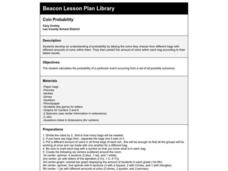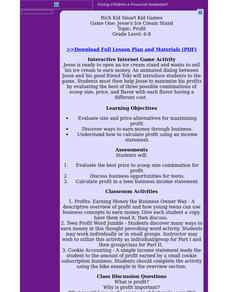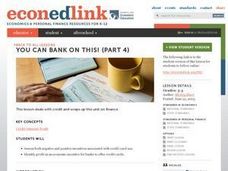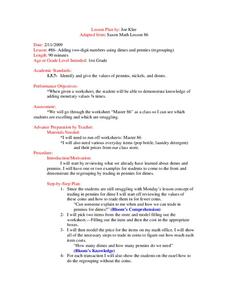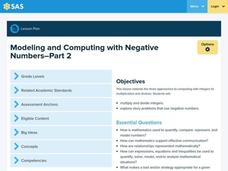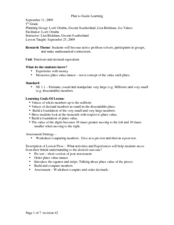Curated OER
Coin Probability
Fourth graders, in pairs, receive three different types of coin bags. They pick coins out of the bag and tally what was picked fifteen times. They do it with all three bags for three separate tallies.
Curated OER
Jesse's Ice Cream Stand
Pupils discover ways to earn money through business. They explain how to calculate profit using an income statement and evaluate the best price to scoop size combination for profit. They discuss business opportunities for teens.
Curated OER
ENERGY USE ADDS UP!
High schoolers investigate the amount of power used in your home and what appliances use the most. They analyze the concept that producing energy costs us money, affects our environment and produces waste products. Students come up with...
Curated OER
"ty" number
Second graders encounter the need to assess the code in English for tens is that the word ends in "-ty." They explore the meaning of two or three digit whole numbers to realize that the meaning of words like sixty can be decoded by...
Council for Economic Education
You Can BANK on This! (Part 4)
Students assess both negative and positive incentives associated with credit card use. They identify profit as an economic incentive for banks to offer credit cards.
Curated OER
The Yo-Yo Problem: Solving Linear Equations
Students compute the length of time it will take to save enough money to purchase a yo-yo. In this math lesson, students create a design with pennies and write the associated linear equation. In this linear equations lesson, students use...
Curated OER
Musical Note Value
Students will identify each symbol by sight stating the value of each. They will use cardboard notes to who what they have learned so far about the note values creating 4 and 6 count phrases.
Curated OER
Buying and Budgets
Fourth graders add and subtract decimals as they use a table to solve budget based problems.
Curated OER
Adding Two-Digit Numbers Using Dimes and Pennies
First graders examine regrouping when adding, by using dimes and pennies to borrow. In this addition lesson, 1st graders work together as a whole group, working together with the teacher.
Curated OER
Plotting with Pennies
Fifth graders use pennies to gather data, organize and order data, graph the data on a stem-and-leaf plot, and evaluate the range, median, and mode of the data.
Curated OER
You're the Cashier!
Third graders use manipulatives and computers to count back change from amounts up to $5.00.
Curated OER
Fractions and Ribbons
Sixth graders explore using inverse operations to solve decimal and fraction problems. In this decimal and fraction lesson, 6th graders prepare ribbon for a part and need to cut it in equal lengths. Students analyze the problem.
Curated OER
Toothpick Bridges
Students study the techniques of building a bridge. They explore different type of bridges and then plan and build a bridge to specified instructions. Students draw plans, keep a budget, and prepare balance sheets during their bridge...
Curated OER
Class Store
First graders explore economics by participating in a group activity. In this commerce lesson, 1st graders conduct a role-playing activity in which they utilize goods and services to re-enact a general store's daily business. Students...
Curated OER
Addition and Subtraction of Signed Numbers
Young scholars explore the concept of adding and subtracting using positive and negative numbers. For this addition and subtraction of signed numbers lesson, students use pennies to represent positive and negative numbers. Young scholars...
Curated OER
Investigation So What's The Difference?
First graders investigate the differences between shapes. In this block characteristics lesson, 1st graders work in groups to explore blocks, group the blocks by different characteristics, discuss the block attributes and record...
Curated OER
Range, Mean, Median and Mode Through the Internet
Students compute measures of central tendency. In this range, mean, median and mode lesson, students gather information on the internet, organize the data and then compute the measures of central tendency. They create a...
Curated OER
Percents: What's the Use
Students research percentages in real world situations. In this percents instructional activity, students demonstrate their ability to apply percents to everyday situations. Students communicate mathematically by conducting interviews...
Curated OER
Calculating Profits from Selling Virtual Lemonade
Students set up and collect data for a virtual lemonade stand. In this entrepreneurship, economics, and technology lesson, students purchase ingredients, determine costs, and set up a virtual lemonade stand. Students consider weather...
Curated OER
Heads or Tails
Seventh graders compare experimental and theoretical probabilities. In this comparing experimental and theoretical probabilities lesson, 7th graders discuss the theoretical probability of flipping a coin. Students flip a coin...
Curated OER
Scarcity, Choice and Decisions
Students study the basic economic trilogy (scarcity, choice, and costs). In this money management lesson, students use a scenario of a High School Prom to calculate how scarcity, choice and cost apply by completing provided worksheets...
Pennsylvania Department of Education
Length and Perimeter
Third graders explore tessellations and the spatial concepts used in creating them. In this tessellations lesson plan, 3rd graders rotate, reflect and transform shapes to create tessellations. Students become familiar with...
Curated OER
Fractions and Decimal Equivalents: Fifth Grade
Sometimes a skeleton is all you get. This lesson outline provides teachers with a basic lesson flow. Pupils will pre-test, order place value names, use manipulatives, and build and compare numbers. How this is to be done is not...
Curated OER
The Stock Market: High School Economics
High school economists learn about the stock market in a project where they "buy" and track stocks. The author of this resource reports it is the high point of her 12th grade economics course, but no resources are attached. After viewing...
